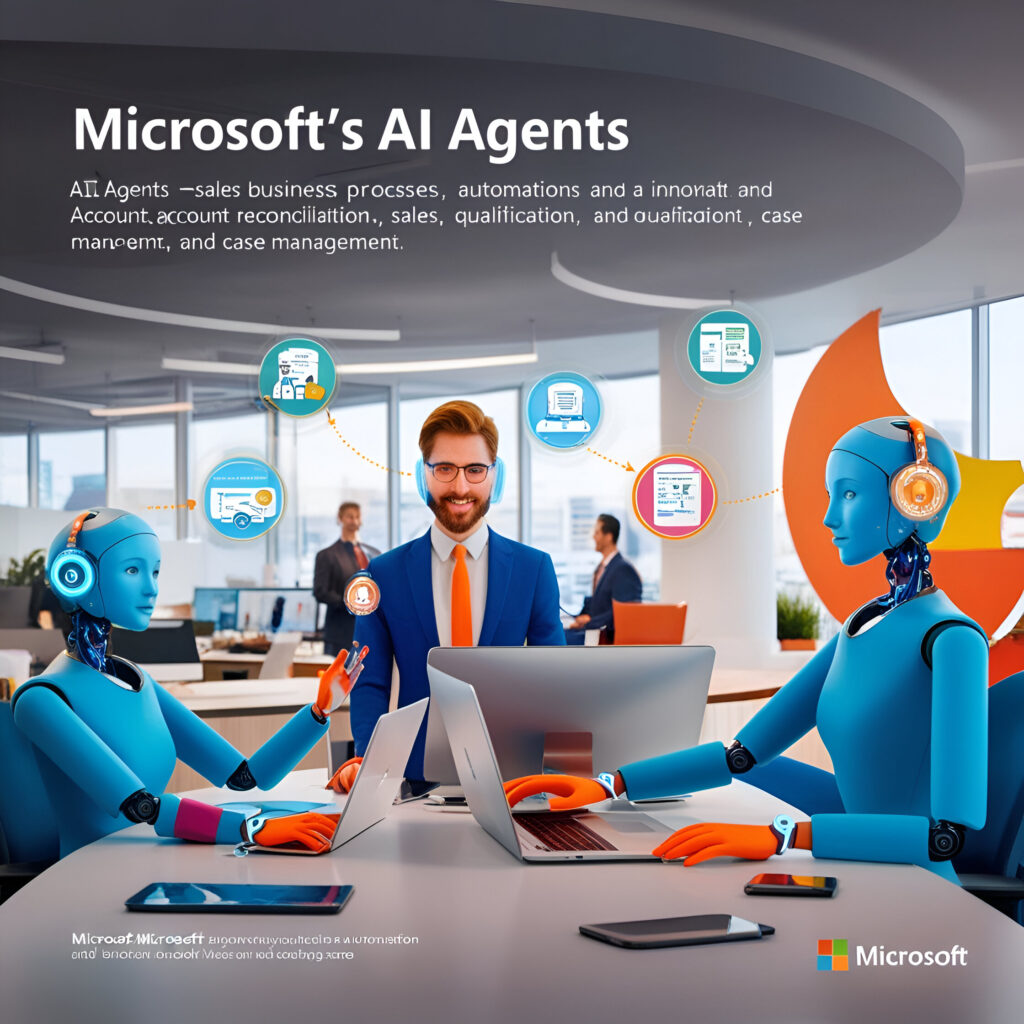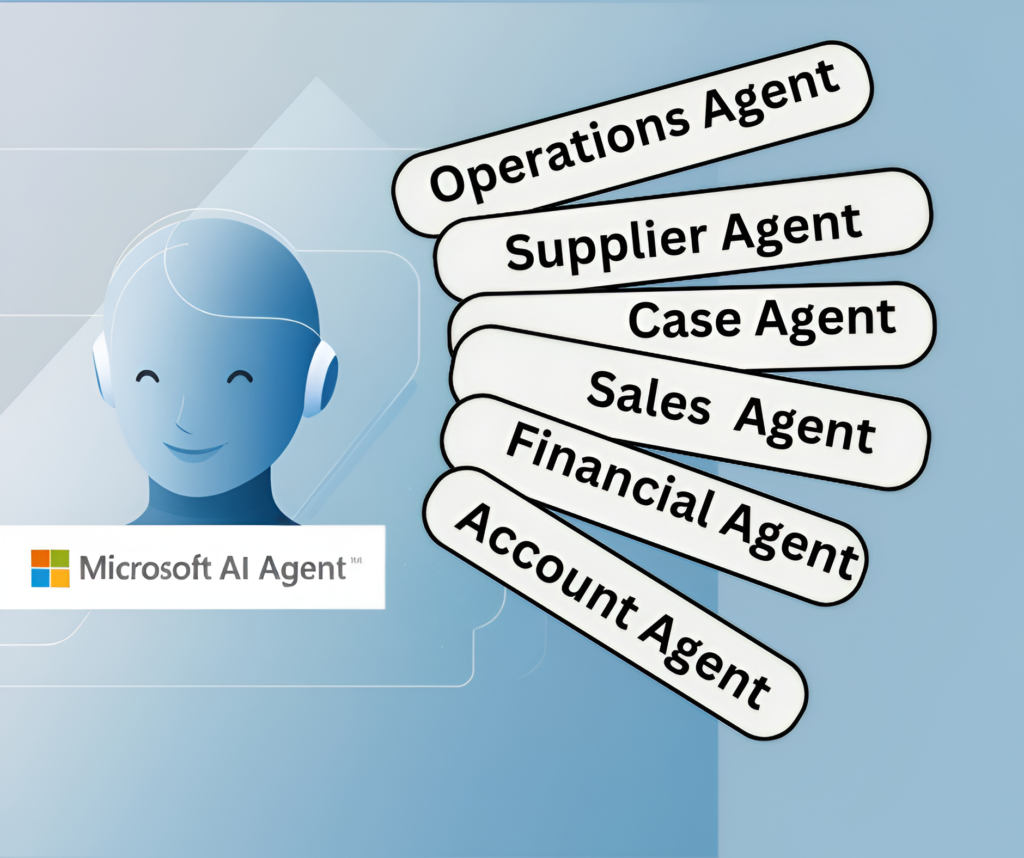Microsoft is continuing on its mission to advance artificial intelligence as it demonstrated at the Ignite conference by announcing ten new autonomous AI agents. The numerous autonomous AI agents will transform how the business conducts operations, impacting different industries and roles. It is a big leap for Microsoft to become one of the leading players in AI-driven enterprise solution markets.
Silicon to Interface
One of the interesting new directions for Microsoft is in how it has moved away from traditional chat-based interfaces. Whereas Copilot Studio was first described around its chat interactions, the event and workflow-driven new agents aren’t dependent on user queries in a chat window for their operation. This change speaks to a new appreciation for how businesses want AI to be used.
Dynamics 365: The Core Platform for AI Agents
The new agents are assimilated into Dynamics 365, the suite of enterprise tools focusing on customer relationship management, enterprise resource planning, and supply chain management offered by Microsoft. The move puts the initiative at par with platforms such as Salesforce as Microsoft aggressively enters the market.
The 10 agents, catalogued to address core business areas such as sales, customer service, finance, and supply chain, are not incremental upgrades but the whole stand-alone solutions that would fit right in with what some startups dedicate their sole focus to develop.

Microsoft 10 Autonomous AI Agents
Sales Qualification Agent
This agent streamlines lead generation and prioritization by analyzing the incoming leads, drafting personal outreach, and guiding sales teams to focus on high-priority prospects, thus optimally directing their efforts and maximizing productivity.
Sales Order Agent
Developed with the idea of automating the sales order process, this agent looks at everything from order placement to even delivery confirmations. It keeps daily operations smooth by taking into consideration customer preferences, stock updates, and follow-up actions that require less manual intervention.
Supplier Communications Agent
This agent for businesses with complex supply chains maintains supplier relationships autonomously. It checks for delivery schedules, identifies potential delays, and takes proactive measures to maintain the continuity of operations.
Financial Reconciliation Agent
This agent automates the reconciliation of financial records to determine the inconsistencies and makes recommendations that can be acted upon. By reducing manual workload, it produces results with accuracy in lessening time to close.
Account Reconciliation Agent
Complementing the financial reconciliation agent, this tool is focused on accurate financial reporting that balances the accounts and removes inconsistencies.
Time and Expense Agent
For all businesses interested in travel and expense reporting, this agent simplifies project accounting and provides timely billing, reduces administrative overhead, enhances fraud detection, and streamlines expense tracking.
Customer Intent Agent
This agent routes customer inquiries to the respective teams of a business. It categorizes requests into sales, marketing, or support through emails or tickets, thus making them more manageable.
Customer Knowledge Management Agent
This agent learns from the interactions of the customer and updates the knowledge base of the CRM. This enables service teams to access exact information, thereby improving their customer support competence.
Case Management Agent
This agent automatically categorizes, assigns, and tracks resolutions for customer service cases from start to finish. It accelerates case handling and shortens resolution times, improving customer satisfaction.
Scheduling Operations Agent
This agent focuses on field operations and assigns tasks to the best persons to tackle any job. After analyzing job requirements and resource availability, it removes inefficiencies in scheduling, with the right person tackling the right job.
Microsoft AI Cross-Agent Key Features
The agents share several common themes:
- Automation: It reduces the number of interventions made manually, thus saving time and resources.
- Categorization and Classification: Many agents rely on AI to categorize data and classify incoming information while setting priorities and routing it correctly.
- Integration: They are developed for smooth integration with the Microsoft ecosystem and third-party tools for immense adaptability across industries.
- Customization and Personalization: Ranging from personalized outreach emails to dynamic scheduling, the agents enhance user experiences by delivering solutions properly contextualized.

Impact on Startups and the AI Landscape
It challenges the majority of the niche startups that specialize in AI solutions. Microsoft, through its scale and integration capabilities, can provide a comprehensive scope which scope many start-ups cannot attain or reach.
It’s also part of a new trend in the AI market – horizontal and vertical solutions. Horizontal aims for broad use-case coverage, while vertical solutions target specific industries or tasks. Microsoft’s agents embody both approaches: versatility and specialization.
Future Directions
These agents’ launch only represents the beginning of things. Microsoft indicated further extensions, probably resolving other business-related issues. This is a double-edged sword; with competition such as Salesforce and SAP investing in AI, the battle to take the automobile money of enterprise automation is on.
Microsoft AI Agents Conclusion
A couple of weeks ago, Microsoft introduced 10 intelligent agents that work autonomously, marking a turning point in the history of enterprise software. Because they can automate complex tasks, remove inefficiencies, and improve decision-making, these agents place Microsoft at the forefront of the AI-business solutions market.
As the landscape evolves, businesses stand to benefit immensely, gaining access to tools that streamline operations and boost productivity. With innovation accelerating, the future of AI in enterprise applications is brighter than ever.
FAQs About Microsoft’s New AI Agents
What are autonomous AI agents?
Autonomous AI agents are systems that operate independently, and have been activated by workflows instead of user commands.
How would these agents change the landscape of businesses?
They automate repetitive tasks, hence reducing costs and improving efficiency.
What is Dynamics 365? How does it interface with such agents?
Dynamics 365 is the collection of enterprise tools offered by Microsoft. The agents blend into the workflow to optimize CRM, financial planning, and supply chains.
Are these AI agents replacing human jobs?
Not exactly. They are trying to help humans, doing all that monotonous work so that employees can focus on strategic activities.
How might a startup remain competitive against a giant like Microsoft?
Start-ups could attempt to focus on niche markets and innovate faster in offering specialized solutions to complement broader platforms like Dynamics 365.
What are Microsoft’s AI agents for?
Microsoft’s AI agents are engineered to automate and augment business processes, such as sales, customer service, finance, and supply chain management.
How are these agents different from traditional AI tools?
Compared to traditional tools, which are more chatbox-like, these agents work independently and are event-driven based on workflows.
What is Dynamics 365 and how would it compare to the AI agents?
Dynamics 365 is the suite of Enterprise Tools by Microsoft in the portfolio for the enterprise for CRM, ERP, and supply chain management. The new AI agents are those that are introduced into Dynamics 365.
Are those agents customizable for particular business needs?
Yes, the agents are highly customizable and enable tailoring solutions specific to the unique requirements of a business.
Will those agents take over people?
They are not to replace humans but supplement them in that they will automate repetitive tasks to enable employees to focus on higher-value activities.
How can the AI agents benefit the small businesses?
They were first intended to meet business and enterprise-level needs, but their scalability and customization may make them accessible to small businesses over time.
How secure are the AI agents?
Microsoft focuses heavily on security to assure that the agents comply with enterprise-grade data protection and compliance standards.
Which types of industries can benefit the most from the use of these agents?
The biggest beneficiaries in terms of industries would include retail, manufacturing, finance, logistics, and customer service.
What impact does this move have on AI space startups?
Microsoft’s comprehensive solutions challenge startups by addressing niches traditionally targeted by smaller companies. However, it also fosters innovation by setting new benchmarks.
What’s next for Microsoft’s AI strategy?
Microsoft plans to expand the capabilities of these agents, integrate them further with existing tools, and develop additional agents tailored to other business challenges.
